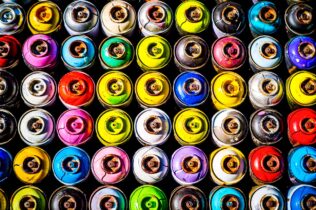
Photo by Sam Haddad.
Last week, we were on the hunt for sidewalk chalk. It’s one of the few socially distant, city kid activities. After trying local stores and Amazon, we finally found two tiny boxes. And the first thing the little kid does is grab a pack and head outside where a bunch of other kids are playing. Within moments, she’s torn apart the entire pack and distributed them to a few kids on our street. They all begin to color and we’re watching as the sticks turn to nubs.
This is on the heels of multiple days. Multiple failed trips to stores. Mask. Sanitize. Ask. Sanitize. Try again. Internet searches. Navigate shitty, poorly rendered CSS. Put items in cart. Send an e-transfer cause they don’t accept credit cards. Call to find out when to pick up the order. No one answers. Head to store. Mask. Sanitize. Ask. Sanitize. Bring chalk home.
Within 10 minutes, the chalk is in pieces. The kids are having a great time.
Happy kids. Sharing. Playing nicely, yet distantly. But as we watch them, mixed in with the joy is something else. A feeling of scarcity. Like there’s not enough. The multi-day loop to get 4 pieces of chalk to have them disappear instantaneously is one more thing we don’t have time or energy for. Everything takes so long right now. Every trip to the store, a bingo card of potential violations. Did you touch the door on the way in? Did you hit the crosswalk button with your elbow? Do these places even sanitize the top of the sanitizer bottles cause, every person smashes their hand against it the moment they walk in the door.
It’s exhausting. We’re on day 100 something and we’re all very tired. And from that tired place, we had a scarcity reaction to small children playing with toys. It’s a pretty fucked up reason to get grumpy. But maybe you can hand-wave at the whole tired parents thing and not think we’re terrible humans. That’s kind of you. Thank you for that.
Grown up scarcity
Last week, we were on a call with a bunch of founders and CEOs. And when we opened for Q&A, someone asked if the pandemic meant companies could offer lower salaries. Basic supply and demand principles. A lot of people got laid off and are in a precarious situation. They might not have many job offers lined up. Many orgs are freezing hiring. Can a company with open roles pay less to new hires who join during a recession?
And lest you think it was one dude being shady on the CEO call, we promise it was not. We had someone reach out after receiving a job offer that was a 15% reduction in base comp and a demotion in title. And the employer had shrugged and said, “yeahbutpandemic, amirite?”
Landlords exploiting people. Employers playing games with compensation. Neighbours hoarding sidewalk chalk. That thing with the toilet paper. The preppers were largely wrong about our immediate response to crisis. But they were right that in persistent crisis, many of us would find it hard to be our best selves. Our instincts are moving from collective to individual. And even when the results are disastrous, a lot of folks are very tired of having to think about others.
Okay so great. So we’re all wrung out. We’re all feeling our assholish tendencies rising to the surface. We’re all getting grabby in the sandbox with literal four year olds. Now what? Well there’s an easy part and a hard part to that.
The easy part is knowing what to do
You do. You know what to do with the salaries and with the sidewalk chalk: start with community. Tech has co-opted community to mean “the people who post on my newsfeed.” We don’t mean them, or at least not only them. The humans you share space with. Your customers, neighbours, and friends. The families of your employees.
What is the choice you can make that feeds your community? Of the available options, even if they’ll never hear about it either way, which is the one you’d be proud for your community to know about? Do that one.
Community is an ancient concept for humans. Much more ancient than the concept of shareholder value. And even with all their complexity and disagreements, it’s pretty easy to guess how a community will respond to decisions like these. The community wants you to treat your workers with dignity. The community wants you to share the sidewalk chalk. Communities play the long game and communities remember who played a short one.
The easy part is knowing what to do.
The hard part is doing it
Much of the world is still in lockdown. And some of the places no longer locked down are seeing horrifying surges. We passed 500,000 dead over the weekend. And we’re more than a month into daily, global marches against anti-Black racism and police violence.
And like, where are you supposed to put all of that? If you’re a leader of people right now– no, fuck that–if you’re a human being right now, it’s a lot to reckon with. The empathy-exhaustion, and the anger that comes with just engaging with the state of the world these days? That’s real.
In the midst of all that, you can know what to do and still have a hard time doing it. You can know that a crisis calls on us all to support each other, and still find yourself pulling away. You will want to keep that budget, and that sidewalk chalk, close to you and away from everyone else.
Sometimes you’re going to give in to that want, is our prediction. And maybe you’ll feel like shit for it afterwards. We don’t have a cool management tool with a funny acronym for that. We’re in the long haul now, and we’re nowhere near the end. You can rise to a crisis, try to be a rock for those around you, and still have days where you lose the fortitude to be your best self.
Instead, the thing we can offer you is this: community is stronger than that. It’s stronger than you having a rough patch. Community isn’t one action, it’s the sum of our actions. As long as you’re in the seat — as a leader, or as a human — you get to make the calls on how you show up. And that means that if you were a lesser, scarcer, grabbier self yesterday, well, you have a chance to be better today.
Listen, when we get through this –and we will get through this– each of our organizations will either be here or it won’t. And maybe you worry that the cost of taking care of people means your company risks not being here. Well, that’s a risk regardless. That’s at risk even if you cut every corner and exploit every advantage over your employees. The question is, is it worth it to have a company that survives the pandemic at any cost? Are those choices you’d be proud of?
We’re being asked as bosses to make choices between the wellbeing of the communities we live in, and the company we help run. In almost every case, the idea that those things are in conflict is a lie. We should all refuse to play that game. But in the cases where they are in conflict, or where we’re forced to pretend that they are, we have a choice to make. You have a choice to make. Companies don’t have intrinsic value. People do.
Choose people.
– Melissa and Johnathan






